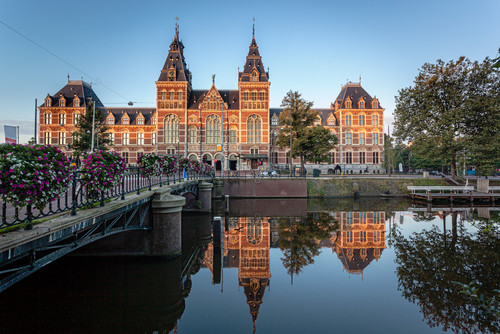Popular Reads
Top Results
Can't find what you're looking for?
View all search resultsPopular Reads
Top Results
Can't find what you're looking for?
View all search resultsDutch Rijksmuseum announces landmark slavery exhibition
Amsterdam's famed Rijksmuseum unveiled plans for a landmark show next year about the Netherlands' colonial role in slavery, saying it would tackle questions raised by the Black Lives Matter movement.
Change text size
Gift Premium Articles
to Anyone
A
msterdam's famed Rijksmuseum unveiled plans Thursday for a landmark show next year about the Netherlands' colonial role in slavery, saying it would tackle questions raised by the Black Lives Matter movement.
The "Slavery" exhibition will be the first major event on the sensitive subject of Dutch involvement in human trade across the Atlantic and Indian Oceans under one roof, museum officials said.
It comes as the Black Lives Matter protests in the United States are changing perceptions globally, and with the debate at home about the Netherlands' own attitude to race and its colonial history.
The colonial past of the Netherlands had an "important role in laying the foundations for the present-day Netherlands," Rijksmuseum director Taco Dibbits said at the exhibition's launch event, held online due to coronavirus restrictions.
"In the colonial history slavery also has an important role and we felt that we should tell that story," he said, adding "I think that Black Lives Matter certainly addresses many questions that are also addressed in the exhibition."
During the height of its colonial empire in the 17th century, the Netherlands kept colonies in the Caribbean including Suriname and Curacao, in South Africa, as well as in the former Dutch East Indies in Asia, the modern-day Indonesia.
The exhibition, which opens next year in February, will tell the story of 10 people whose lives were intricately interwoven with slavery -- from slaves themselves to slave and plantation owners to those who resisted the practice.
Read also: Dutch king may stop using carriage celebrating colonial past
'Extreme severe conditions'
This included the story of a man born into slavery on a plantation in Suriname at the time it was under Dutch colonial rule and eventually dying as a slave there.
A central exhibit to illustrate the man's story is a sugar cane juice boiling kettle, showing how slaves were forced to work day-and-night under "extreme severe conditions," museum officials said.
Also in the exhibition are drawings of the same plantation, made for its young Dutch owner named Jonas Witsen, who inherited it but who had no intention of ever visiting there.
Each of the 10 stories are accompanied by an audio tour told by contemporary narrators who have a direct connection to people featured.
"The exhibition doesn't give answers to all the questions, but it is there to stimulate visitors to think about the system of slavery," said Eveline Sint Nicolaas, senior curator at the Rijksmuseum.
The Rijksmuseum holds priceless works from artists such as Rembrandt who flourished during the "Golden Age" of Dutch art, which was itself fueled by the riches coming in from the colonies.
The Netherlands has not formally apologized for its role in the slave trade.
But Dutch Prime Minister Mark Rutte admitted in the wake of the Black Lives Matter protests earlier this year that racism was also a problem in the Netherlands.
Calls are also intensifying in the Netherlands to scrap Black Pete, a festive children's character that traditionally accompanies Saint Nicholas, wearing blackface, thick red lips and an afro wig.
Activists say "Zwarte Piet" is racist and harks back to the Dutch colonial past.
The Rijksmuseum exhibition was all about "history that has not left behind yet," said Valika Smeulders, the Rijksmuseum's head of history.
It runs from February 12 to May 30 next year.











